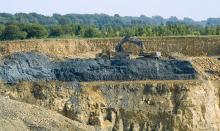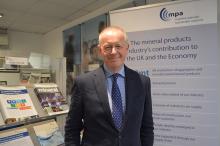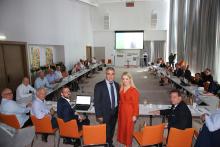
Last year’s UEPG-estimated and COVID-19 pandemic-influenced reduction of just 5% on 2019’s 4.2 billion tonnes aggregates output of the EU27, UK, EFTA (European Free Trade Association - Iceland, Liechtenstein, Norway and Switzerland), plus Ukraine, Belarus, Moldova, Turkey, Israel and the Balkans, tells you all you need to know about the sector’s resilience, says Aurélie Delannoy.
Unsurprisingly, the MPA’s director of Economic Affairs and UEPG Economic Committee chair has other figures close to hand that illustrate the aggregates and wider mineral products industry’s ability to adapt and continue to operate in extreme conditions.
“The UEPG collates production data from 42 European countries, and what we saw is that some countries were hit quite hard – such as Spain, France, Germany, and the UK. But there were also some countries, like Poland and Norway, that posted growth rates in 2020 compared to 2019. I think this is partly based on how COVID-19 lockdowns were approached, along with some countries being better equipped to operate in extreme circumstances. However, out of 42 countries – 10 saw growth, and 16 showed a less than feared production decline. We are waiting to confirm data on the other countries.”
Delannoy says efficient administering of the €750 billion EU [COVID-19] Recovery Fund in the 2021-2023 period will be crucial to sustaining growth in European mineral products demand.
“The caveat to all big political spending commitment announcements is the time lag from when the announcement is made to seeing the difference on the ground. While the Fund is linked to COVID-19 recovery, it will also assist in the transition of countries to lower carbon economies and in their digital transformation. From an economic perspective, a lot will also depend on the recovery of the tourism industry, particularly those of southern European countries.”
Delannoy says the UK market last year was very much a tale of two halves. “The first half of the year saw COVID-19 and the first lockdown cause major disruption to both construction activity and the supply chain. There were mass closures of housebuilding and commercial construction sites, and construction output collapsed, especially in April, before starting to pick up a bit in May. Looking at Q2 2020 mineral product demand, aggregate, asphalt, concrete, and mortar sales were all down 35-65% below where they were at the end of 2019. It was an unprecedented decline.
“Unexpectedly, though, there was a very rapid market recovery that came in the second half of 2020. This propped up mineral product demand and was driven by house landscaping and home improvement works, along with infrastructure works, notably HS2, which is gaining momentum. Last year was still down mineral product sales-wise compared to 2019 as you can’t write off three months and hope to make it up in a short space of time. But the market decline was far less than we originally feared.”
Turning her attention to the first four months of 2021, Delannoy says that the UK construction industry and mineral products demand has shown resilience in the face of a “number of headwinds”. “There has been a further lockdown and associated restrictions, Brexit, and a quite wet winter with heavy rainfall, particularly in the east of England. All these factors impact construction activity and mineral products demand.
“MPA members have told us that March was a lot better than January, but if you look at Q1 data overall, the recovery continued. Construction output is now only 4-5% below where it was before the pandemic. Looking forward, the likes of the CPA (Construction Products Association) and Experian are forecasting double-digit growth in construction output this year and a further 5-7% growth in 2022. The drivers behind this will be housing and infrastructure, as well as repair and maintenance work.”
Delannoy says UK mineral products sales have also seen encouraging growth in the first few months of 2021. “They are recovering from last year’s low base. Asphalt sales are particularly noteworthy, linked to a rise in road construction. In fact, on a quarterly basis, asphalt sales have actually exceeded pre-pandemic levels, although annual totals are still down.
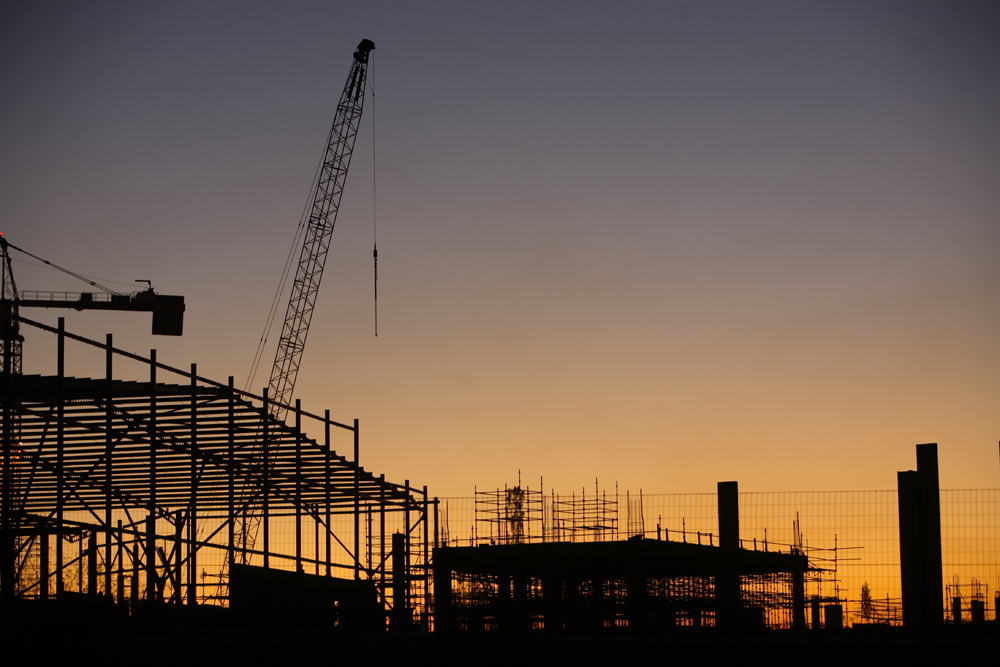
“Further recovery in mineral product sales during the rest of this year into 2022 is predicated on the infrastructure project pipeline that the government has put in place. There is quite a lot of concern about demand outside of that, especially in commercial construction.
“Back in 2019, UK commercial construction, including retail and offices, was the second-largest category of new building work after housebuilding. However, before the pandemic, it was already being affected by Brexit-related uncertainties, which reduced investment. The shift to online retail has become more acute during the pandemic, impacting on business confidence. The pandemic has also brought the future of homeworking and office construction to the fore. Given these factors, we don’t expect this part of the construction industry to recover fast. This hits demand for ready-mixed concrete, which is used in a big chunk of commercial construction works.”
Delannoy notes that UK and wider European market forecasting is made harder by the fact that although the COVID-19 vaccination programme in the UK is encouraging, more needs to be done in other countries.
Having worked at the London-based MPA for more than seven years, Delannoy, who hails from Lille, northern France, last year also took on the role as chair of the UEPG’s Economic Committee.
Speaking of her 2021 priorities across the two roles, she says: “The most immediate priority for the MPA and UEPG is to ensure that mineral extraction is considered part of the solution in the context of the post-pandemic recovery and Europe’s long-term growth plan, while, at the same time, meeting and adapting to the challenge of climate change.
“The consensus internationally is that the recovery should include large-scale investment in new large infrastructure based around low carbon and environmental protection. A range of mineral product materials is critical to delivering this, and we want governments to understand that the supply of these materials should not just be assumed; they need to be properly planned, monitored and managed.
“At the MPA, one of the tools we have to inform this debate is long-term mineral products demand and supply scenarios covering the next 15 years. The first document based on these was published in 2016. I hope to fully update this document, taking into account the unprecedented situation we find ourselves in, including the unprecedented policy response by governments. Crucially, none of what governments want to do infrastructure-wise is possible without our industry.”
Delannoy says three big areas are currently dominating MPA members’ discussions with her and Association colleagues. “In the short to medium term, they are looking at the foundations of the pandemic recovery, the implications of Brexit, particularly around trade between mainland Britain and Northern Ireland, and how they can meet the UK Government’s net-zero carbon emissions by 2050 target.”
The importance of the UK mineral products industry is captured in MPA-collated data. The industry directly contributed to the UK economy by generating over £5.8 billion in gross value added in 2018 and a turnover of £16 billion. It also enabled a further £597 billion turnover in industries downstream in the supply chain. The industry employs 81,000 people directly at over 2,000 active sites and plants and supports an additional 3.5 million jobs throughout the supply chain.
“Our industry is critical to delivering both the UK and EU Government’s infrastructure strategies, decarbonisation and the UK Government’s ten-point plan for a green industrial revolution,” explains Delannoy. “Our job at the MPA and UEPG is that policymakers are aware of the impressive contribution the mineral products industry makes, not only in terms of economic activity but in terms of biodiversity and site restoration recovery. A lot of work is also going on in the concrete industry, for example, in going beyond the net-zero carbon emission target.”
Delannoy says the COVID-19 pandemic has placed even more attention on UK and wider European mineral products production site health and safety. “It has enabled the industry to prove its great work in this area and to adapt to extreme working conditions.”
The wide variance in the size of national mineral products markets is an important factor, says Delannoy, when assessing country and regional operating differences within the European mineral products industry.
“There are some very big national producers, like Russia, which produces over 700 million tonnes of aggregates a year. Following that, you have Germany producing almost 600 million tonnes per year, France producing over 400 tonnes, and Poland and the UK, which each produced 272 million tonnes in 2019.
“Another interesting area is per capita annual consumption. In Norway, it’s 23 tonnes per capita. That’s a lot when you consider the UK, for example, is four tonnes per capita. In Ukraine and Moldova, you get down to two tonnes per capita. The variances can be due to the state of the economy, building preferences, and climate.” According to the latest UEPG figures, Europe’s average aggregates consumption is six tonnes per capita.
Delannoy also notes a big difference in recycled aggregates production rates. “In France, Netherlands and Germany, recycled aggregates make up 20-30% of overall aggregates production. The UK has had a 28-29% recycled aggregates rate within overall aggregates production in recent years. That’s twice the rate in the mid-1990s and represents a significant contribution to total aggregates supply.
“In terms of growing recycling rates across Europe, their availability depends on a local and suitable supply of demolition waste, but at the same time, there is more emphasis on a longer lifespan for building products and avoiding waste.
“This means more renovation of buildings and infrastructure, and adapting to climate change and extreme weather conditions, in line with the EU Green Deal.”
I am curious to know whether Delannoy sees the COVID-19 pandemic as having a long-term impact on Europe’s mineral products industry. “I think it very much depends on the speed and nature of the recovery and what type of policy drivers are put in place.
“If you compare the current crisis to where we were in the 2008-2012 period after the 2008 global financial crisis, they are two different crises. The 2008 crisis was essentially a financial crisis led by the housing sector, which negatively impacted the construction industry. The current COVID-19 pandemic is a health crisis with governments internationally placing construction, via infrastructure investment, at the heart of recovery plans.
“This has created an opportunity to create a new normal: better buildings, improved infrastructure, and a better response to climate change, including more biodiversity. This is a great chance to showcase the great work our industry has been doing for years and for us to play a key role in building back better.”
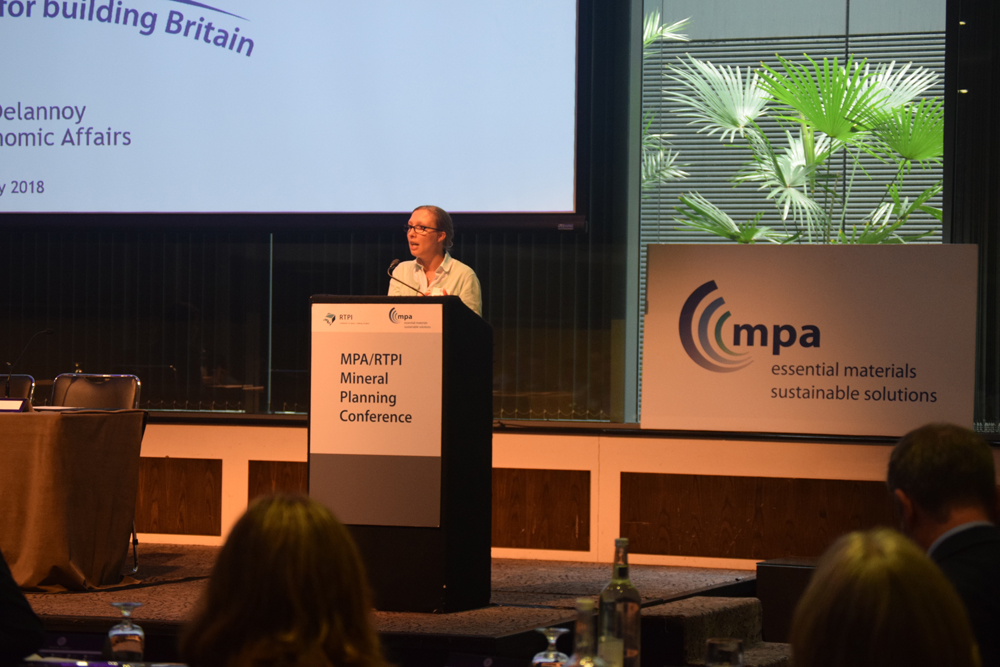
The MPA has for a long time called for greater clarity in the UK mineral planning system, the absence of which, the Association says, threatens future supplies for construction.
“An area to watch is the Government changes to the national planning regime aiming to make the English planning process faster, simpler and more predictable. However, it is focused on housebuilding and does not consider the more holistic picture, including mineral planning needs.
“From a wider European perspective, a lot of attention is being paid to the EU’s sustainable finance initiatives trying to encourage private financing of projects that improve biodiversity and helps the transition to a low carbon economy. We are wondering what that means for the mineral products industry. Will it enable the industry to qualify for sustainable finance funding?
“There is also the EU Biodiversity Strategy for 2030, which aims to have strict protection on 10% of European territory, and there is a potential risk for our industry in not being able to access sites within that area. There is a need for policymakers to recognise the work our industry is doing in terms of wildlife habitat creation and biodiversity.”
Focusing on the impact of Brexit, the UK’s withdrawal from the EU and the European Atomic Energy Community on 31 January 2020, Delannoy says: “In mainland Europe, there is very little impact on the aggregates market as materials have very short ranges of transportation. It is more of an issue for the UK market. It exports marine aggregates – mainly to Belgium and the Netherlands, but also to France. There are also exports of mineral products like clays, lime, and dimension stone. On the import front, the UK imports cement and machinery parts, most of which comes and goes from the EU27.
“Since the start of this year, MPA members have been reporting a rather challenging trading environment in terms of non-tariff barriers, more paperwork, and lengthy customs procedures, and added logistic and storage costs. The UK and EU governments can do better on making things more straightforward. Currently, the MPA and MPA Northern Ireland are trying to push governments on both sides to inject a little bit of pragmatism and willingness to improve on this situation as, ultimately, everyone would benefit from that.”
Asked how she sees the aggregates and wider mineral products industry in Europe in a decade’s time, Delannoy says: “I think visually the infrastructure of the industry will look pretty much the same because the fixed plant is bought for the long term. Functionally, the transition to net-zero operating will have become more apparent. There will have been a change in the energy used to power plants and machinery on-site and vehicles transporting it to customers. Mineral extraction sites will also be more linked to renewable energy production. There are already examples of companies doing this.”
Delannoy believes the European mineral products industry’s work to restore former production sites to nature will be more recognised by government policymakers in 10 years. “The UK mineral products industry, for example, has already created around 80km² of priority wildlife habitat through site restoration, and a further 110km² are set to be created. That’s equivalent to half the size of the Isle of Wight! It shows that our industry is walking the walk when it comes to site restoration and biodiversity.
“I have to admit to being very puzzled at the lack of awareness of what the mineral products industry is and does to help the UK economy and our way of life. Nobody wants a quarry in their back garden, yet everyone wants more housing, better transport and other infrastructure. The reality is not hitting home of what we need to meet this demand, and that’s especially true of Government policymakers.”
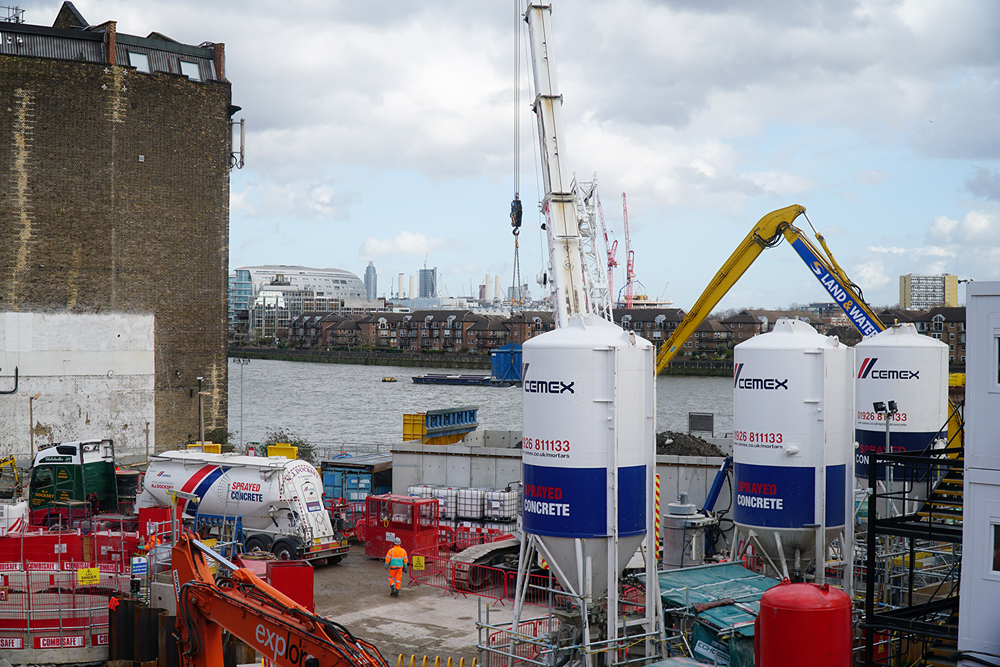
Improving the UK and wider European mineral products industry’s diversity is another key issue for Delannoy. “We need to bring more women and ethnic minority workers into the industry and younger people. We can only get stronger by doing this.”
Before joining the MPA’s executive team, Delannoy spent three years as a research officer at the NIESR (The National Institute of Economic & Social Research), Britain’s longest established independent economic research institute.
Her impressive academic background includes postgraduate research in Petroleum Economics at the University of Lille; a two-year Masters degree in European Economics (first year at Vilnius University in Lithuania, and the second at the University of Kiel in Germany); and a BSc degree in Economic Analysis & Management Studies from the University of Lille.
“I’ve lived, studied and worked in four European countries and travelled across the continent. I was once a cleaner, a call centre operator, and I have been a secondary school and university teaching assistant. I have also been an academic, and now I am a business economist. I think my journey shows that I am really an economist at heart. I am also a mum now to a two-year-old, which has its own challenges.
“I think my life and career to date have given me a certain level of personal resilience. It has also exposed me to people from different backgrounds who have their way of doing things. This is quite important in helping me do my work with the UEPG, in particular. It is not just about different cultures; it is different mindsets. I am used to that and enjoy this side of my work.
“My approach to work and life is to never stop learning. The day you stop learning is the day you stop moving forward. Communication and listening skills are also so important. You need to present concepts and ideas clearly. In my line of work, you also need to be able to handle scrutiny. I also love being so in touch with the mineral products industry, being a practical economist and getting my hands dirty!”
It will be very much to the UK and wider European mineral products industry’s great benefit if Aurélie Delannoy continues to crunch numbers at the quarry data face for many years to come.

